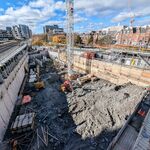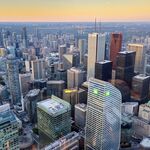W. K. Lis
Superstar
Generally, I seem to feel that the people in suburbs live there to "get away" from the city "problems". When the city "problems" reach them, they turn nasty.
Case in point, see link on
Case in point, see link on
Generally, I seem to feel that the people in suburbs live there to "get away" from the city "problems". When the city "problems" reach them, they turn nasty.
Case in point, see link on
Yeah, we have been having a bit of this discussion in the Rofo thread. Are people who choose to live in the suburbs doing so because they are afraid of 'difference'? Perhaps downtowners celebrate difference, and suburbanites seem to want to deny its right to exist. It is a a very topical discussion seeing as this divide in perception is the reason we have this mess of a mayor.
King of Kensington said:I just don't get how someone from the Beaches or Bloor West Village can say they're a "hardcore downtowner" with a straight face.
Certainly lots of people are happy with the term suburb, many more likely don’t care what the part of town they live in is called, but over the last few years these two parts of the city have been pitted against each other, as if downtown and suburb are foreign countries in need of a United Nations intervention. But there’s so much overlap between the two, a peacekeeping force would not know where to go.
http://www.thestar.com/life/2014/05/09/in_toronto_there_is_no_real_downtown_no_real_suburb.html
No city goes straight from "downtown" to "suburb".
I just don't get how someone from the Beaches or Bloor West Village can say they're a "hardcore downtowner" with a straight face.

Only on weekends.
Whatever the writer's definition of city versus suburb is, there's nothing new about the struggle for power between the two.
The Metro Chairmen, at least since 1972 when I hired on with the city, were all from Etobicoke, North York, Scarborough and York. ( East York was always left out. ) None were from Toronto.
Since the Mega-City, Only David Miller was from Toronto. ( Not even an area of Toronto that some might refer to as "hard-core" downtown, either. )
Lastman was from North York, and of course Ford is from Etobicoke.
If you can't walk to a grocery store from your house, then you live in the suburb.
If you can't walk to a grocery store from your house, then you live in the suburb.
Generally, I seem to feel that the people in suburbs live there to "get away" from the city "problems". When the city "problems" reach them, they turn nasty.
What I have noticed is that suburb want/are jealous of the positives of "downtown" but none of the negatives. For example wanting subways but don't want the density or the centre/clinic that is mentioned i n your quote
The subway debate shows this when they think people who are downtown (which I think a lot consider old city and especially south of Bloor/Danforth) all have these amazing subway rides everywhere. But of course reality most of the people living in original Toronto are taking street cars and buses. I hardly ever take the subway, I only take it if I am going a ways away, which isn't all the often. But Streetcar and buses, I am on those all the time.
To be fair, some fellow downtowners also need to understand that they don't live in a spacious suburb so it's probably a good idea not to have multiple huge dogs in your tiny living space and playing card size backyard.




